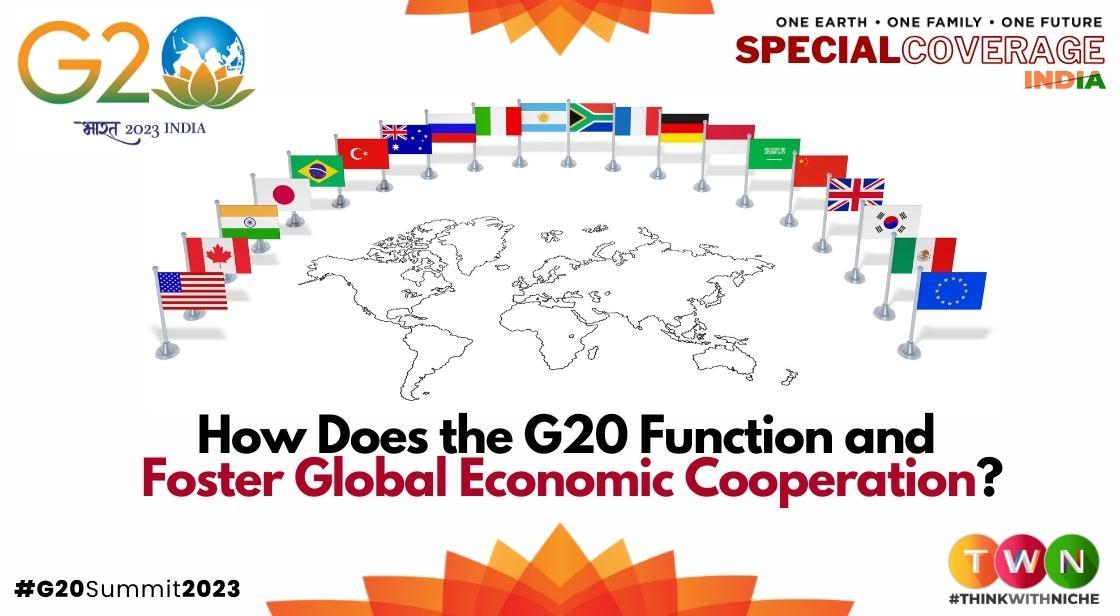How Does the G20 Function and Foster Global Economic Cooperation

Blog Post
The G20, or Group of Twenty, stands as a testament to the power of international collaboration in shaping the global economic landscape. As we approach the 18th annual G20 Heads of State and Government G20 Summit 2023, scheduled for September 9 and 10 in New Delhi, it is essential to comprehend the intricate workings of this influential gathering.
The summit serves as the zenith of a year-long process involving ministers, senior officials, and civil society representatives who engage in discussions, deliberations, and meetings within the G20 framework.
From its inception during the global financial crisis in 2008 in Washington DC, the G20 has evolved into a pivotal platform where the world's major economies converge to discuss and harmonize their economic policies.
This article embarks on a journey to unravel the inner mechanisms of the G20 and its critical role in fostering international economic cooperation.
From its informal structure to its ambitious agenda, we will delve into the factors that have propelled the G20 to the forefront of global economic governance.
Through the examination of pivotal events, including responses to financial crises and the rise of emerging economies, we will trace the G20's journey from its inception to its current status as a premier forum for international economic collaboration.
As the world faces new economic challenges, the G20 remains poised to play a vital role in promoting global economic stability and addressing critical issues such as climate change, protectionism, and the digital revolution.
In this article, we aim to provide a comprehensive understanding of how the G20 functions and its enduring significance in the realm of international economic cooperation.
As we approach the eagerly anticipated G20 Summit 2023 in New Delhi, scheduled for September 9 and 10, it's worth delving into the intricacies of this important event.
This summit serves as the culmination of a year's worth of deliberations, discussions, and meetings held within the G20 framework, involving ministers, senior officials, and representatives from civil societies.
Remarkably, this will mark the 18th annual summit of its kind since the G20's establishment, with the inaugural summit taking place in Washington DC back in November 2008.
The G20, essentially a consortium of the world's major economies, serves as a vital platform for the cooperative exchange of ideas and strategies concerning economic policies. In this article, we will explore the inner workings of the G20 and its pivotal role in fostering international economic cooperation.
The G20 serves as a platform where the largest global economies converge to engage in discussions and synchronize their economic strategies. Its establishment in 1999 was a direct response to the Asian financial crisis. This consortium plays a vital role in fostering international economic cooperation.
The G20 has been instrumental in promoting international economic cooperation. It has helped to coordinate responses to the global financial crisis, the COVID-19 pandemic, and other major economic challenges. The G20 has also been a leader in promoting sustainable development and global health.
How Does the G20 Function and Foster Global Economic Cooperation
What is the G20
The G20, officially known as the Group of Twenty, consists of 19 countries, namely Argentina, Australia, Brazil, Canada, China, France, Germany, India, Indonesia, Italy, Japan, Republic of Korea, Mexico, Russia, Saudi Arabia, South Africa, Turkey, United Kingdom, and the United States, along with the European Union.
These member nations collectively represent a significant portion of the global economy, accounting for approximately 85 percent of the world's GDP, over 75 percent of global trade, and about two-thirds of the global population. As a platform for international economic cooperation, the G20 plays a crucial role in shaping and strengthening global governance on key international economic matters.
The primary objectives of the G20 include:
-
Coordinating economic policies among its member countries to achieve global economic stability and sustainable growth.
-
Promoting financial regulations that mitigate risks and prevent future financial crises.
-
Establishing a new framework for international financial governance.
What Is the Origin and Purpose of the G20?
The G20's origins can be traced back to the early 1990s, following the collapse of the Soviet Union and the end of the Cold War. Simultaneously, emerging economies in the Global South, such as Brazil, China, and India, were gaining prominence in the global economic landscape.
This shifting global order highlighted the need for reforms in global governance and international institutions. Existing forums like the G7 and organizations like the World Bank were ill-equipped to address the challenges arising in this evolving international landscape.
In 1997, the Asian financial crisis struck several rapidly growing East Asian economies and subsequently spread to Latin America. It was during this crisis that the G20, initially referred to as the G22, was established in 1998.
Initially conceived as a one-time crisis-response meeting, the G20 held two additional meetings in early 1999, expanding its membership to 33 countries (referred to as G33) to discuss reforms in the global economy and the international financial system.
In late 1999, the G20 in its current composition was officially founded as an informal forum. It convened annually, bringing together Finance Ministers and Central Bank Governors from its member nations to address critical economic issues on a global scale.
How the G20 Operates: An Informal Structure for International Collaboration
The G20 is a forum for the world's 20 largest economies to discuss and coordinate economic policies. It was created in 1999 in response to the Asian financial crisis. The G20 works through a variety of mechanisms, including summits, ministerial meetings, and working groups.
The G20 operates as an informal grouping, setting it apart from organizations like the United Nations (UN). Unlike the UN, the G20 lacks a permanent secretariat or dedicated staff. Instead, the G20 presidency rotates annually among its member countries, with the responsibility of shaping the G20's agenda, coordinating its activities, and hosting its summits.
To assist the presidency in its role, a "troika" is established, comprising the previous, current, and incoming presidencies. For instance, India currently holds the presidency from December 1, 2022, to November 30, 2023, with the troika consisting of Indonesia (the previous presidency), India, and Brazil (the upcoming presidency).
Another key aspect of the G20's informality is that while the decisions made within the group hold significance, they are not automatically put into effect. Instead, the G20 serves as a platform where leaders engage in discussions on various issues and make declarations, signifying their intentions. Subsequently, the actual implementation of these declarations falls to individual nations or international organizations.
For example, if the G20 issues a declaration related to trade, the execution of that declaration will be overseen by entities like the World Trade Organization (WTO).
The G20 Summit:
The G20 summit is the highest-level meeting of the G20. It is held annually and it is hosted by a different country each year. The summit is attended by the leaders of the G20 countries, as well as the heads of the International Monetary Fund (IMF) and the World Bank.
The G20 summit is the main decision-making body of the G20. It sets the agenda for the G20 and it agrees on policy measures to address global economic challenges.
Ministerial Meetings:
The G20 also holds a number of ministerial meetings throughout the year. These meetings are attended by the finance ministers and central bank governors of the G20 countries. The ministerial meetings discuss the implementation of the decisions made at the G20 summit and they also prepare the agenda for the next summit.
Working Groups:
The G20 also has a number of working groups that focus on specific issues, such as financial regulation, climate change, and development. The working groups meet regularly to discuss and develop policy proposals.
How Decisions Are Made in the G20:
Decisions in the G20 are made by consensus. This means that all 20 countries must agree on a decision before it can be adopted. This can be a slow and difficult process, but it ensures that all countries have a say in the decisions that are made.
The Evolution of G20 as a Leading Forum for International Economic Collaboration"”
The G20 plays an important role in promoting international economic cooperation. It has helped to coordinate responses to the global financial crisis, the COVID-19 pandemic, and other major economic challenges. The G20 has also been a leader in promoting sustainable development and global health.
There are a few reasons why the G20 has become the premier forum for international economic cooperation.
First, the G20 includes the world's largest economies, which means that it has the power to make decisions that affect the global economy.
Second, the G20 is a relatively informal forum, which makes it easier for countries to reach consensus.
Third, the G20 has a broad agenda, which allows it to address a wide range of economic issues.
The G20 and the Global Financial Crisis:
The G20 played a major role in responding to the global financial crisis of 2008. The G20 leaders' summit in Washington, D.C. in November 2008 agreed on a number of measures to stabilize the financial system and stimulate economic growth. These measures included:
-
The injection of trillions of dollars into the financial system by central banks around the world.
-
The passage of fiscal stimulus packages by governments around the world.
-
The creation of the Financial Stability Board (FSB), to monitor the global financial system and identify risks.
The G20's response to the global financial crisis helped to prevent a deeper and more prolonged recession. It also showed the world that the G20 is a capable forum for international economic cooperation.
The G20 and the Future of Global Economic Cooperation:
The G20 is likely to continue to play an important role in global economic cooperation in the years to come. The G20 will need to address a number of challenges, such as the rise of protectionism, the digital revolution, and climate change.
However, the G20 has a proven track record of success, and it is well-positioned to meet these challenges.
Here are some of the key events that led to the G20 becoming the premier forum for international economic cooperation:
-
The Asian financial crisis of 1997-1998, which showed the need for stronger international cooperation to prevent and manage financial crises.
-
The creation of the G20 in 1999, which was a response to the Asian financial crisis.
-
The global financial crisis of 2008, which was a major test for the G20 and showed its ability to coordinate a global response.
-
The rise of China and other emerging economies, which has made the G20 more representative of the global economy.
The G20 is a dynamic forum that is constantly evolving. It is likely to continue to play an important role in international economic cooperation in the years to come.
The G20 and the Global Economic Crisis of 2008:
The G20 leaders' summit played a major role in responding to the global economic crisis of 2008. The summit agreed on a number of measures to stabilize the financial system and stimulate economic growth. These measures included:
-
The creation of the Financial Stability Forum, which was later renamed the Financial Stability Board (FSB), to monitor the global financial system and identify risks.
-
The injection of trillions of dollars into the financial system by central banks around the world.
-
The passage of fiscal stimulus packages by governments around the world.
Also Read: Major Takeaways from the G20 Summit 2023 India
The G20 leaders' summit also agreed to work together to prevent another financial crisis. This included measures to strengthen financial regulation and to improve the oversight of the financial system.
The G20 and the Future of Global Economic Cooperation:
The G20 leaders' summit is a vital forum for international economic cooperation. It has helped to promote global economic stability and growth. The G20 is also a leading force in addressing global challenges such as climate change and sustainable development.
The G20 is likely to continue to play an important role in global economic cooperation in the years to come. The G20 will need to address a number of challenges, such as the rise of protectionism, the digital revolution, and climate change. However, the G20 has a proven track record of success, and it is well-positioned to meet these challenges.
The Future of the G20:
The G20 is likely to continue to play an important role in global economic cooperation in the years to come. The G20 will need to address a number of challenges, such as the rise of protectionism, the digital revolution, and climate change. However, the G20 has a proven track record of success, and it is well-positioned to meet these challenges.
Conclusion:
The G20, as an engine of international economic cooperation, has continually proven its worth on the global stage. Through its inclusive nature, informal structure, and comprehensive agenda, it has facilitated discussions and coordinated policies among the world's major economies.
From its origins in the wake of financial crises to its responses to emerging global challenges, the G20 has evolved into a pivotal forum for addressing complex issues such as climate change, digital transformation, and sustainable development.
As it embarks on its 18th annual summit, the G20 remains a beacon of hope for global economic stability and collaboration.
You May Like
EDITOR’S CHOICE












